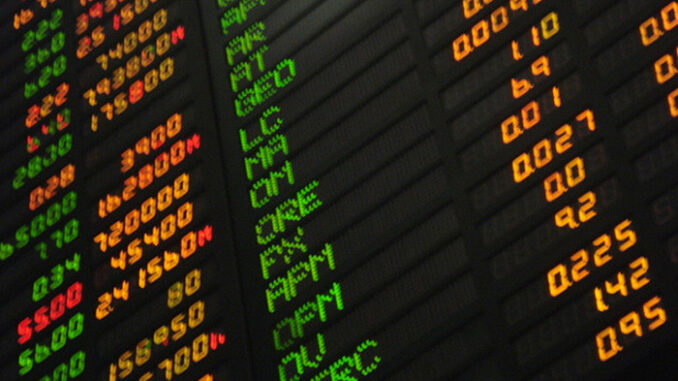
The main index of the Philippine Stock Exchange plunged by more than 100 points Tuesday, snapping a two-day winning streak, on concerns about the upcoming US presidential election.
The PSE index (PSEi) closed at 7,239.98, down by 103.26 points, or 1.41 percent, while the wider-all shares index ended at 3,977.31, lower by 58.89 points or 1.46 percent.
“The bourse was weighed by the weakness of the local currency against the US dollar and the rise in local treasury yields,” Philstocks Financial research head Japhet Tantiangco said.
Data from the Bankers Association of the Philippines showed the peso closed at 58.27 against the US dollar Tuesday, down from 58.22 Monday.
“Investors are also taking a cautious stance amid the uncertainties caused by the upcoming US elections,” he said.
All sectoral indices were in the negative territory, with properties incurring the most losses, down 2.29 percent, while services plunged 1.53 percent. Decliners edged advancers, 147 to 55.
Foreign investors were net sellers for the day contributing to the market’s decline. Net foreign selling stood at P933.59 million.
There were only three index gainers for the day, with Century Pacific Food Inc., climbing 0.36 percent to P41.95. Globe Telecom Inc. was the worst index performer, dropping 7.33 percent to P2,100.
Meanwhile, Asian markets fluctuated in volatile trade Tuesday with investors looking ahead to the release of US economic data and the earnings reports of tech titans this week.
Oil prices steadied following sharp falls Monday on relief that Israel’s strikes on Iran spared the country’s energy infrastructure and that the risk of escalation in the Middle East had eased.
Concerns in the oil market have now shifted back to focus on potential oversupply in 2025 and a slowdown in demand from China, the world’s largest oil importer, according to analysts.
US stocks closed higher Monday, boosted by the cheaper oil, and as investors look ahead to a busy week of economic indicators with the market already hovering near record highs.
The US government will release its third quarter GDP growth estimate this week, as well as its closely watched monthly labour market report, ahead of the Federal Reserve’s next rate decision just after the US presidential election.
Futures traders currently overwhelmingly expect a 25 basis points cut, according to CME FedWatch.
Investors are also eyeing the earnings reports of five of the “Magificent Seven” tech giants due this week, including Google parent Alphabet, Amazon, Apple, Facebook-parent Meta, and Microsoft.
Asian markets fluctuated with Tokyo, Hong Kong, Sydney, Seoul and Kuala Lumpur in the green, while Shanghai, Singapore, Taipei, Bangkok and Manila retreated.
London, Frankfurt and Paris all rose in early European trade.
Japanese shares built on the previous day’s strong gains as cheaper oil and the weaker yen boosted the market despite the political uncertainty following Sunday’s general election which left the ruling coalition short of a majority.
Investors are also awaiting the Bank of Japan’s rate decision later this week, with the central bank expected to stand pat following two hikes earlier this year.
“Although BoJ monetary policy will not be directly affected by the political machinations underway to find a governing coalition in Tokyo, it is likely that the next government will need to scale up fiscal spending,” said Alvin Tan of RBC Capital Markets.
“In this vein, there could be increased pressure on the BoJ to go slow on policy tightening.”
Focus is also on a key political meeting in Beijing next week, with investors hoping for details of an expected major stimulus plan to support the Chinese economy, which has struggled to recover from the pandemic with growth dragged down a debt crisis in the property sector.
The People’s Bank of China on Monday rolled out a new lending tool to inject liquidity into the market, with about 2.9 trillion yuan ($407 billion) in loans set to expire in November-December.
“With the clock ticking, Beijing hopes this tool will prop up market sentiment and counter any looming liquidity crunch,” said Stephen Innes, analyst at SPI Asset Management.
“The timing here isn’t just tactical; it’s essential. China’s economic engine has been sputtering with soft demand and lackluster growth data, and with the potential shake-up of the US election looming enormous, stability in the financial markets is critical for Beijing,” Innes said. With AFP


Be the first to comment